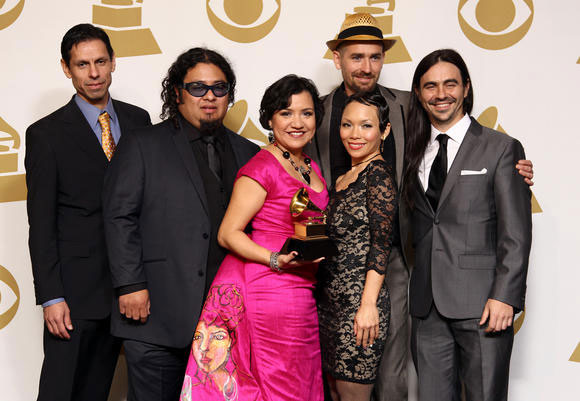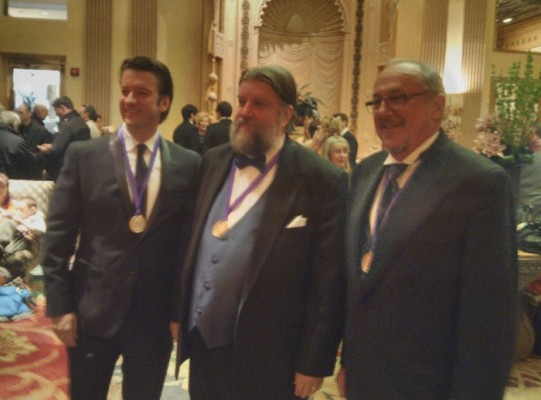And the winner is…
Adele. Usher. Beyoncé. Smithsonian Folkways. What? The staid old Smithsonian in this heady company? You bet! The 55th annual GRAMMY Awards took place Feb. 10 in Los Angeles, featuring dazzling performances and the presentation of more than 80 awards recognizing some of the most talented artists in the music industry. Among those watching from the audience in anticipation were Richard Burgess, director of marketing and sales for Smithsonian Folkways; Production Manager Mary Monseur; Archivist Jeff Place; Sound Production Supervisor Pete Reinger; Graphic Design contractor Fritz Klaetke; and Director and Curator Dan Sheehy, representing Smithsonian Folkways’ five Grammy nominations:
- Best Historical Album—Woody at 100: The Woody Guthrie Centennial Collection
- Best Boxed or Special Limited Edition Package—Woody at 100: The Woody Guthrie Centennial Collection
- Best Children’s Album—Elizabeth Mitchell’s Little Seed: Songs for Children By Woody Guthrie
- Best Latin Rock, Urban or Alternative Album—Quetzal’s Imaginaries
- Best Album Notes—Stephen Wade’s Banjo Diary: Lessons from Tradition
At the end of the glamour-filled evening, Smithsonian Folkways walked away with two awards: Best Boxed or Special Limited Edition Package and Best Latin Rock, Urban or Alternative Album.
Smithsonian Folkways has been nominated 25 times and has received seven awards. Considered one of the greatest honors in the industry, GRAMMY nominations and awards offer an opportunity to reach millions of people through music.
Smithsonian Folkways differs from other labels in what it hopes to do with the attention garnered after an award. While others may aim to sell more records and make the big bucks, Smithsonian Folkways aspires to create a “world of sound.” This goal began with the original Folkways Records founder, Moses Asch. A Polish immigrant working as an audio engineer in New York City, Asch was inspired to record music by none other than Albert Einstein. As legend has it, Asch met the famous physicist in 1940 when he recorded him reciting a radio message warning Jews to flee Germany. Einstein then, as the story goes, suggested that Asch should create “an encyclopedia of sound” of all the music in the world. Asch founded Folkways Records in 1948, and released nearly 2,200 albums (an average of one per week!) until his death in 1986. The collection was acquired by the Smithsonian in 1987, and was the genesis of Smithsonian Folkways.
Today, the Smithsonian Folkways collection contains more than 3,000 albums and 45,000 songs. Some of its most famous artists include Woody Guthrie, Pete Seeger, Lead Belly and Ella Jenkins, but there are many, many less heralded artists in the collection, whom Asch believed were no less deserving of attention. Smithsonian Folkways is committed to making its entire collection accessible to everyone by digitizing the music, cover art and album liner notes, all available at folkways.si.edu.
Online streaming and downloading has dramatically changed the music industry in the last 10 to 15 years. Overall, the market size of the recorded music industry has shrunk 50 precent as a result of many factors, including music piracy and the sale of digital tracks versus CD sales. But greater digital access to the vast Smithsonian Folkways collection has actually increased revenues by approximately 25 percent during the same time frame.
Smithsonian employees can save 20 percent off at folkways.si.edu by using the code SIEMPLOYEE13. You can also visit the Smithsonian Folkways mail order department on the second floor at the Smithsonian’s Capital Gallery location in Washington, D.C.—just another of the many perks that comes with being a Smithsonian employee.
Learn more about the making of Woody at 100:
Posted: 27 February 2013
-
Categories:
Feature Stories , History and Culture , Kudos , News & Announcements





